英语:Module 5 Unit 1 You like western classical music,don’t you课件3(外研版八年级上)
- 格式:ppt
- 大小:4.28 MB
- 文档页数:36
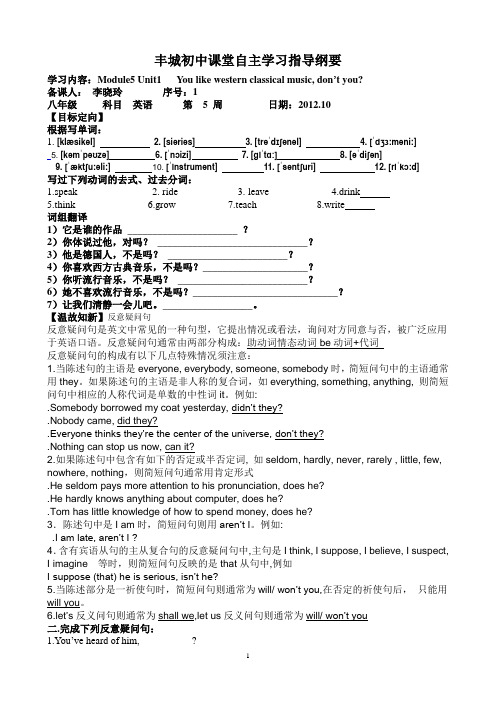
丰城初中课堂自主学习指导纲要学习内容:Module5 Unit1 You like western classical music, don’t you?备课人:李晓玲序号:1八年级科目英语第 5 周日期:2012.10【目标定向】根据写单词:1.[klæsikəl]2. [siəriəs]3. [trəˈdɪʃənəl]4. [ˈdʒɜ:məni:]5. [kəmˈpəʊzə]6.[ˈnɔizi]7. [ɡiˈtɑ:]8.[əˈdiʃən]9.[ˈæktʃu:əli:]10. [ˈinstrumənt] 11.[ˈsentʃuri] 12.[riˈkɔ:d]写过下列动词的去式、过去分词:1.speak ______ ______2. ride ____ _____3. leave _____ _____4.drink5.think _____ _____6.grow_____ ___7.teach _____ ______8.write词组翻译1)它是谁的作品______________________ ?2)你体说过他,对吗?______________________________?3)他是德国人,不是吗?________________________?4)你喜欢西方古典音乐,不是吗?_____________________?5)你听流行音乐,不是吗?__________________________?6)她不喜欢流行音乐,不是吗?_____________________________?7)让我们清静一会儿吧。
__________________。
【温故知新】反意疑问句反意疑问句是英文中常见的一种句型,它提出情况或看法,询问对方同意与否,被广泛应用于英语口语。
反意疑问句通常由两部分构成:助动词情态动词be动词+代词反意疑问句的构成有以下几点特殊情况须注意:1.当陈述句的主语是everyone, everybody, someone, somebody时,简短问句中的主语通常用they。
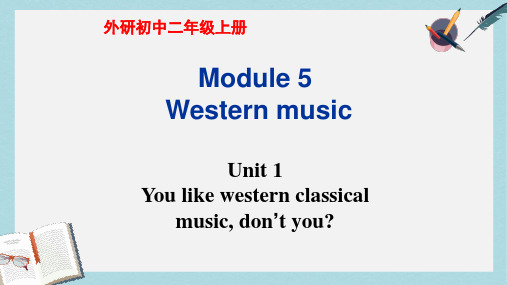
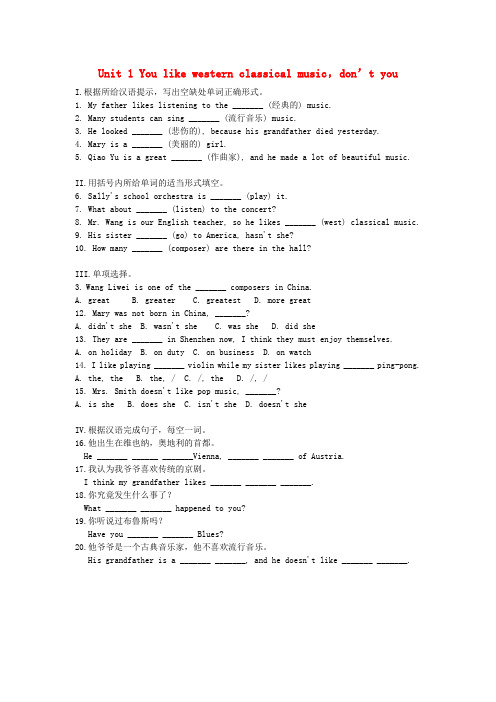
Unit 1 You like western classical music,don’t youI.根据所给汉语提示,写出空缺处单词正确形式。
1. My father likes listening to the _______ (经典的) music.2. Many students can sing _______ (流行音乐) music.3. He looked _______ (悲伤的), because his grandfather died yesterday.4. Mary is a _______ (美丽的) girl.5. Qiao Yu is a great _______ (作曲家), and he made a lot of beautiful music.II.用括号内所给单词的适当形式填空。
6. Sally's school orchestra is _______ (play) it.7. What about _______ (listen) to the concert?8. Mr. Wang is our English teacher, so he likes _______ (west) classical music.9. His sister _______ (go) to America, hasn't she?10. How many _______ (composer) are there in the hall?III.单项选择。
3.Wang Liwei is one of the _______ composers in China.A. greatB. greaterC. greatestD. more great12. Mary was not born in China, _______?A. didn't sheB. wasn't sheC. was sheD. did she13. They are _______ in Shenzhen now, I think they must enjoy themselves.A. on holidayB. on dutyC. on businessD. on watch14. I like playing _______ violin while my sister likes playing _______ ping-pong.A. the, theB. the, /C. /, theD. /, /15. Mrs. Smith doesn't like pop music, _______?A. is sheB. does sheC. isn't sheD. doesn't sheIV.根据汉语完成句子,每空一词。

初二英语dule Unit 1 u lie estern lassial usi, dn’t u?学案初二英语duleUnit1ulieesternlassialusi,dn’tu?学案duleesternusiUnit1ulieesternlassialusi,dn’tu?【学习目标】、能够运用本有关词汇、句型表达自己的喜好,并询问他人的喜好。
2、能够听懂别人对音乐的描述,能够辨别不同反意疑问句的意思。
3、了解不同音乐的特点,并初步认识一些音乐大师。
【学习过程】、检查预习情况)两人小组进行词汇的英汉互译。
2)小组内交流准备的音乐家或音乐类型的资料,并用英语简单加以介绍。
2、新知识的导入。
)展示:au’veheardfStrauss,haven’tu?bShedesn’tlieppusi,desshe?ielistenedtazzesterda,didn’the?dBett’sparentsan’tplatheguitar,anthe?2)交流:结对回顾并检查反意疑问句的构成和其它相关要点。
3、专项练习:请结对或在小组内以音乐为话题,用反意疑问句做对话,互评并纠正出现的错误。
Eg:A:Ilielassialusiulieit,dn’tu?B:es,Idulistenedtapieefbeautifullassialusilastnight ,didn’tu?A:N,Ididn’tIplaedthepianuan’tplathepian,anu?B:N,Ian’t参考词汇:blues,lassial,azz,pera,pp,r,tehn,gspel,rapbeautiful,fast,fun,draati,livel,dern,sad,serius,sl, traditinal,nisdru,trupet,guitar,pian,flute,rgan,vilin、听力训练(1)多层听。
听音乐和七段对话,每段对话描述了一种音乐,根据所听到的内容选出所介绍的音乐。
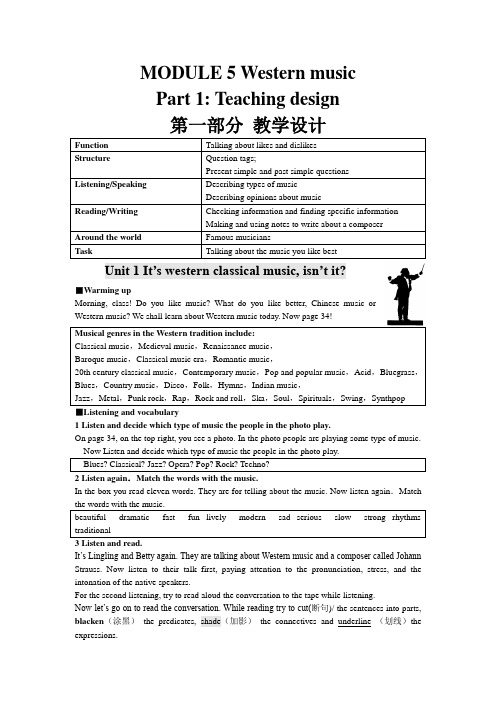
MODULE 5 Western musicPart 1: Teaching design第一部分教学设计Function Talking about likes and dislikesStructure Question tags;Present simple and past simple questionsListening/Speaking Describing types of musicDescribing opinions about musicReading/Writing Checking information and finding specific informationMaking and using notes to write about a composerAround the world Famous musiciansTask Talking about the music you like bestUnit 1 It’s western classical music, isn’t it?■Warming upMorning, class! Do you like music? What do you like better, Chinese music orWestern music? We shall learn about Western music today. Now page 34!Musical genres in the Western tradition include:Classical music,Medieval music,Renaissance music,Baroque music,Classical music era,Romantic music,20th century classical music,Contemporary music,Pop and popular music,Acid,Bluegrass,Blues,Country music,Disco,Folk,Hymns,Indian music,Jazz,Metal,Punk rock,Rap,Rock and roll,Ska,Soul,Spirituals,Swing,Synthpop1 Listen and decide which type of music the people in the photo play.On page 34, on the top right, you see a photo. In the photo people are playing some type of music.Blues? Classical? Jazz? Opera? Pop? Rock? Techno?2 Listen again.Match the words with the music.In the box you read eleven words. They are for telling about the music. Now listen again.Matchbeautiful dramatic fast fun lively modern sad serious slow strong rhythms traditionalIt’s Lingling and Betty again. They are talking about Western music and a composer called Johann Strauss. Now listen to their talk first, paying attention to the pronunciation, stress, and the intonation of the native speakers.For the second listening, try to read aloud the conversation to the tape while listening.Now let’s go on to read the conversation. While reading try to cut(断句)/ the sentences into parts, blacken(涂黑)the predicates, shade(加影)the connectives and underline (划线)the expressions.4 Match the words with their meanings.On page 35 in the box there are four words and four sentences. Match the words with their5 Check(√)the true sentences.You read eight sentences. Some of them are false, and some of them are true. Now in pairs readNow correct the false:Number 3 is wrong. According to the conversation, Betty likes classical music.Number 4 is also wrong. According to the conversation, Lingling listens to Chinese pop music and she loves it.Number 5 is wrong, too. Beethoven lived in Vienna.Number 6 is wrong. Tony doesn’t like classical music.Number 7 is not correct. Daming has never liked classical, but he likes pop music.Number 8 isn’t correct either. Daming has become a fan of techno.■Pronunciation and speaking6 Listen to the speaker asking a real question.Sometimes we have a real question in mind. And we ask someone this question for an answer.Sometimes we ask someone a question not for an answer, but for checking information.Now say the sentences aloud. Use the speaker's intonation.学*优ω中╓考≦,网。
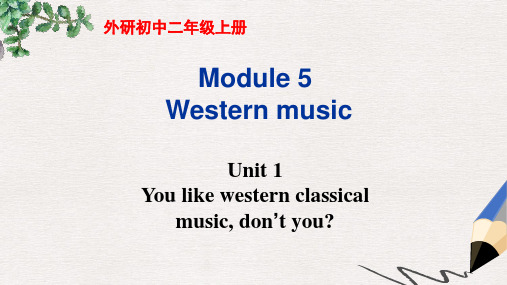
外研八上M5 Unit 1 You like western classical
music,don't you教案
外研版八年级上册Module5Unit1教案
《Westernmusic》教学设计
----初二上册Module5Westernmusic
Unit1Youlikewesternclassicalmusic,don’tyou
教材、学生分析:
本单元是Module5的第一单元。
本单元以“音乐”为话题,介绍了不同类型的音乐以及施特劳斯、莫扎特、冼星海等音乐大师。
学生在学习的过程中通过描述自己喜欢的音乐,从而掌握“喜好”的表达方式,培养综合运用语言的能力和培养音乐智能,音乐智能是学生应该发展的多元智能的一部分。
本单元要求学生:(1)掌握有关“音乐”的单词;(2)能够结合音乐、图片、影视材料来判断音乐的种类,介绍音乐;(3)能够听懂别人对音乐的描述,并能用适当的形容词来评论各类音乐;(4)能够表达自己的喜好,询问他人的喜好,并能够表达对别人的观点同意与否。
教学目标:
1、德育目标
(1)让学生感受到他们学英语是为了在现实生活中进行交流,而不单纯是为了英语课和应付考试而学习;
(2)音乐是人类共有的精神食粮,音乐智能是学生应该发展的多元智能的一部分。
通过描述、评论自己喜欢的音乐,培养学生的音乐智能,提高学生的整体素质。
2、知识目标:。
MODULE 5 Western music模块5 西方音乐Unit 1 You like westernclassical music, don'tyou?第一单元你喜欢西方的古典音乐,是吗?Tony:I like this music! Who's it by?托尼:我喜欢这支乐曲。
是谁演奏的?Lingling:Well, I'm notsure, but Sally's schoolorchestra is playing it.玲玲:哦,我不知道,也许的萨利的学校管弦乐队演奏的。
Betty:It's by Strauss.You've heard of him,haven't you?贝蒂:这是施特劳施写的乐曲。
你听说过他,是吗?Lingling:Yes, I have.He was German,wasn't he?玲玲:是的,我听说过。
他是德国人,是吗?Betty:No, he wasn't.He was Austrian. He wasborn in Vienna,the capital of Austria. 贝蒂:不,他不是德国人。
他是奥地利人。
他出生在奥地利的首都维也纳。
Daming:What's it called?Betty:The Blue Danube.The Danube is the riverin Vienna. 大明:这曲子叫什么名字?贝蒂:《蓝色多瑙河》。
多瑙河是维也纳的一条河。
Lingling:You likewestern classical music,don't you?Betty:Yes, I do.玲玲:你喜欢西方的古典音乐,是吗?贝蒂:是的,我喜欢。
Lingling:Who's yourfavourite classicalcomposer?玲玲:你最喜欢的古典音乐作曲家是谁?Betty:Beethoven. But Ialso like pop music.You listen to pop music,don't you?贝蒂:贝多芬。